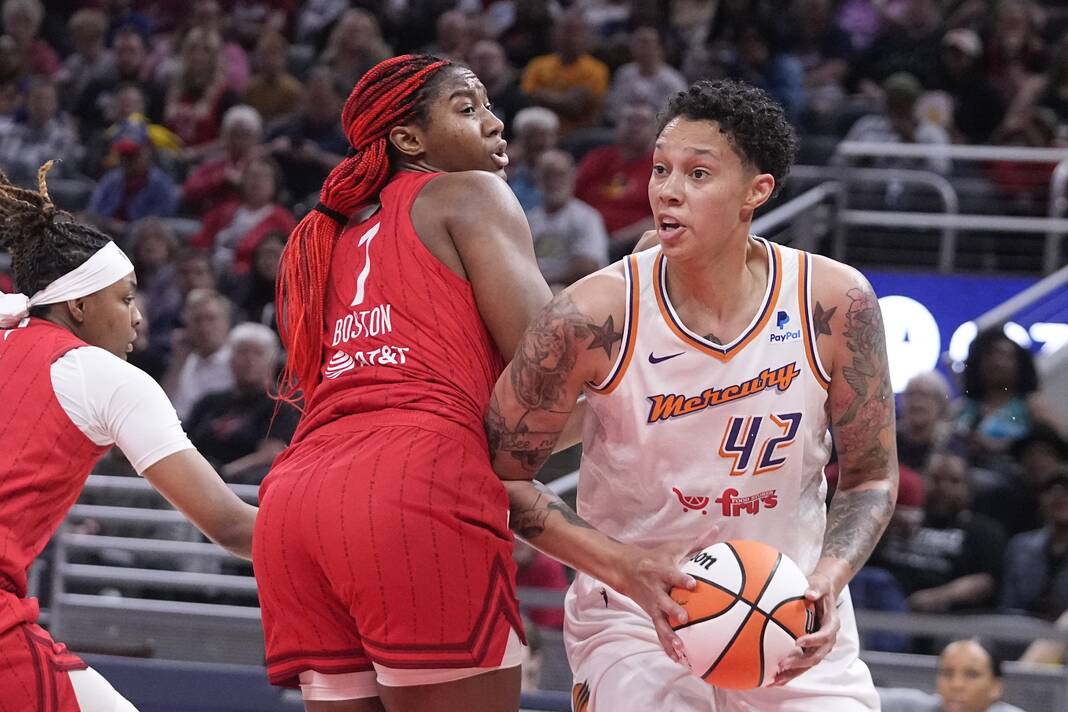
Phoenix Mercury’s Brittney Griner (42) goes to the basket against Indiana Fever’s Aliyah Boston during the first half of a WNBA basketball game, Sunday, June 11, 2023, in Indianapolis.
(AP Photo/Darron Cummings)
Few Americans will either experience the overseas trauma suffered by Brittney Griner, or discover their country cares enough about them to fight for their freedom.
When Griner, the 6-foot-9 WNBA star center accepted a gold medal as a member of the Team USA women’s basketball team at the recent Paris Summer Olympics and listened to the National Anthem played, she had tears on her cheeks.
It has been quite the journey for Griner, 33, a native of Houston, Texas, an All-American at Baylor, and a 10-time All-Star who just recently played for the Phoenix Mercury against the Fever here in Indianapolis.
 Freedman
Freedman
There is probably nothing like hearing the Anthem being played for you to make you feel more American – except having the president rescue you from a Russian prison.
As a Black, gay woman who had lived through discrimination and took a stand for Black Lives Matter a few years ago and urged people not to give respect for the National Anthem, Griner made enemies.
Then, her personal circumstances changed so unfairly and dramatically, she needed the Biden Administration’s aid.
Players in the WNBA compete over the spring and summer in what is the off-season from all other U.S. basketball, high school, college and the NBA. The women’s league’s pay scale is not nearly as munificent as the men’s, so female pros also compete overseas.
One of those more profitable opportunities was in Russia, where Griner became a fixture and helped carry her Russian Premier League team to four European championships. She even said Russia felt like a second home to her.
Griner’s life went haywire at the Moscow Airport in February of 2022. Going through customs she was halted for having roughly a thimbleful of cannabis oil in her possession.
Griner has a doctor’s medical marijuana prescription in the United States for use because of past sports injuries, but even that tiny amount was illegal in Russia.
The simple thing for the Russians to do, given how much Griner had contributed to the country’s sports success, would have been to confiscate this little bit of contraband, throw it away, and make the incident disappear.
But no. The nightmare was just beginning. Instead, the Russians, who are really good at such behavior, blew the matter up into an international matter. Griner was taken into custody, sent to prison, and then absurdly sentenced to nine years in prison for drug smuggling. She didn’t even have enough of a drug to give away.
This was hardly a one-off. The Russians already had jailed other Americans for trumped-up infractions. They claimed Paul Whalen was a spy and sentenced him to 16 years in prison. Evan Gershkovich, a Wall Street Journal correspondent, was also accused of espionage and was sentenced to 16 years.
I am always attuned in to these cases because they could have been me.
When Mikhail Gorbachev took over as president of the then-Soviet Union, he instituted reforms called glasnost (openness) and perestroika (political reform) for the Communist state.
In 1987, I visited the country as the only journalist in an American delegation meeting with Russians to try to improve relations. Seemingly average citizens sought to buy the blue jeans off my legs and my watch off my wrist. Shelves in stores were empty. The State Department had a don’t-drink-the-water advisory except the bottled kind. Experienced Russian watchers in the group cautioned that even hotel rooms were probably bugged.
Our hosts refused permission to visit Chernobyl, the nuclear plant which had melted down in 1986 and that probably saved my life in the long run since I avoided radiation poisoning.
Instead, I was assigned a young translator to accompany me on reporting rounds. I conducted man-in-the-street interviews in Red Square asking what people thought of glasnost and perestroika. In some cases, they literally ran away from an American reporter. Glasnost and perestroika apparently had not yet taken hold yet – and been considerably loosened since.
Approaching one man, there was much banter. I leaned into him and softly said, “What’s going on?” I will never forget the translator’s next words: “He says he is from the KGB and we are to come with him.”
The KGB, the notorious spy agency. The man in the trench coat (really) marched us across the Square to a guard tower and turned us over to a uniformed man, who sat us on a bench. It was obvious this guy wondered how we had become his problem, then embarked on a series of lengthy phone calls.
As an illustration of how Russian thinking never changes, months earlier, Nicholas Daniloff of U.S. News and World Report had been arrested and charged with spying. Daniloff was held just more than two weeks, however, before being retrieved by the Reagan Administration.
I got off much easier, being held in place more like two hours before the guard told us to get lost. When the translator and I walked behind a wall of Red Square I told him we should resume quizzing people. He gazed at me as if I was nuts, and I said, “He didn’t tell us to stop.”
As for Griner, her detention provoked international complaint, unifying petitions from WNBA players, and the accusation of being “wrongfully detained” from the U.S. government. Months later, she was part of a prisoner swap.
More recently, B.G. wrote a book about her ordeal called “Coming Home.” She wrote of the depression of being out of touch with loved ones, fear being housed in rough conditions, with poor quality food and wondering if she would ever get out.
In Paris, after Americans won the gold medal, an emotional Griner said, “My country fought for me to get back and I was able to bring home gold for my country.”
It was her third basketball gold medal, but no doubt the sweetest.
